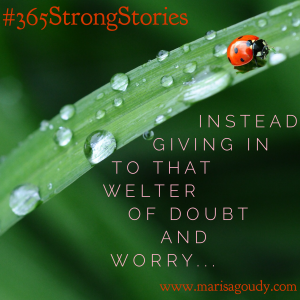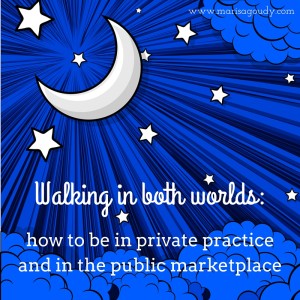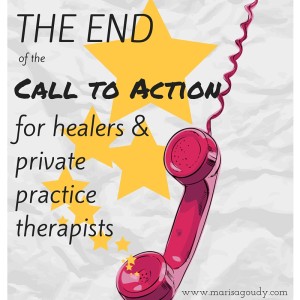
BLOG
5 Reasons to Keep Writing & Creating Content You Care About, #365StrongStories 55
 Anyone could blame the weather.
Here in New York, we have been been slipping from spring sunshine to a few inches of February fluff to slush and misty gloom. All of it is born away on a tide of mud that just never washes out.
Anyone could blame the weather.
Here in New York, we have been been slipping from spring sunshine to a few inches of February fluff to slush and misty gloom. All of it is born away on a tide of mud that just never washes out.
Or, I could blame motherhood and all the ways it shatters my focus and steals my sleep.
And, if I chose, I could blame the creative impulse itself. This need to write and share and connect with readers is a mad, beautiful journey.
No matter the reason, it’s easy to lose track of the “why” during long, dreary days at home in front of the laptop. It's easy to forget about the great goals when the to do list never ends.
Why add more words and pages to this noisy digital world? Why steal time from my family just to try to be seen and read by strangers? Why not just get a job instead of making it all up as I go along?
The welter of worries that threatens to swallow all the creative and professional dreams. You know them too, I am guessing?
And so, the aimless Facebook scrolling begins. Fortunately, I’ve been at this game of questions long enough to stop myself before I start reading my spam messages or looking up high school boyfriends’ little sisters.
Instead, I seek out the resources I know will replenish me and get me back on course: the insights from clients and colleagues I know and love.
We're much the same as we try to carve out enough space for family and relationships and for entrepreneurship and creative passions too. We have unique goals and needs and sources of inspiration to make the balancing act work, but when we can rally together to share the “why” of it all, all of us can get back on track.
This isn't the first time I've worried that there are too many stories out there already, of course.
Luckily, last time I began to believe that the emerging thought leaders I long to help were just too busy being awesome at life and work to sit down and create content they really care about, a wise friend and colleague got me back on track. She reminded that she knows writing and diving deep into her ideas is vital to her practice and her big dreams.
As she described it, you need to write blog posts and HuffPo articles and all the rest because:
- Content builds trust
- It’s how clients get to know you
- It’s how you weed out the wrong people before they even call
- It’s how you first inspire people to know you’re worth your full fee
- Content makes people want more of you in programs and classes and all the good stuff you want to sell
I couldn't have said it better myself!
Your turn: Are you convince you need to create content? What's your "why"? (And I would love your answers even if you're thinking "I know I should start writing but I just can't make it a priority")
The end of the "call to action" for healers and private practice therapists
Sovereign Standard, Issue 32 What is your goal when you sit in a room with a client?
What is your goal when you sit in a room with a client?
To guide, to partner, to support. Perhaps to educate and inspire.
What about “convince” or “persuade”? Um, ick.
The role of the healer
As an energy healer with my own small practice, I cringe at the thought of “convincing” a vulnerable client of anything while she lies on my table. Though I am not bound by the codified ethics of a mental health or other licensed medical practitioner, I am bound by my own personal ethics and by the basic “job description” that my teacher and mentor Eleanora Amendolara gave me:
To be a healer is to facilitate another’s awakening.
To facilitate and hold space for another person’s unfolding is a privilege and an honor I don’t take lightly - and as a clinician or holistic professional, I know you also feel the precious weight of such a responsibility too.
In session, deep work takes place. Huge blocks get cleared. A great deal of pain and resistance might emerge in the process. As a healer, you are the witness and the source of safety.
You don’t force or convince anyone of anything that isn’t theirs. The healing wisdom each individual needs is already within. You’re there to help unlock those hard-to-find internal doors and windows.
The healer’s experience as a marketer
How do you get those beautiful people in need into your office so you can perform your magic and offer up your healing medicine?
You market yourself.
At least that’s the mainstream way to talk about it.
You use ads and in-person networking and social media and you create a website that converts. You develop just the right copy and just the right elevator speech that speaks to the pain points and shows that you’ve got just the solution.
Some of this marketing stuff feels fine, some a little suspect, and some advice simply doesn't apply to you. You do what you have to do to spread your message and introduce your work to your perfectly imperfect people.
Walking in both worlds: the private practice and the public marketplace
 As you know, I am steeped in this marketing process.
As you know, I am steeped in this marketing process.
I moonlight as an energy healer - quite literally, in the sense that my healing abilities get charged up thanks to a sighting of the moon. She reminds me that there’s a great big universe out there that puts all our human stories in perspective.
But my “real” job is as a writing coach who helps you produce meaningful content so you can be an effective player in the online marketing game.
I walk in both worlds. And, as a healing professional who is building a business, you do too.
We perceive the dissonance between the persuade, convert, sell approach and the gentle, connected process of actually helping people.
But we agree that "marketing" isn't a dirty word, right?
“Marketing is a bad word” is so 2010.
Saying “I don’t do marketing” with a vaguely superior shudder just doesn’t cut it anymore. You probably don’t even know many practitioners like that since you’ve set out to connect with colleagues who share your growth mindset!
[tweetthis]The "I don't do marketing" attitude is so 2010. I'm a healer with a growth mindset.[/tweetthis]
So, yes, we have accepted - and embraced! - the dynamic, creative process that is content marketing. We use blog posts, articles, and social platforms to tell stories that draw readers and clients.
But, still, there’s dissonance between the mainstream messages about how to lure clients and the experience you create for the clients you have.
If “persuade them to take action” is the foundation of marketing, do you have to be one person in your treatment space and someone else when you're trying to attract clients online?
In a word: no.
You can walk in both worlds, stay true to yourself, and build business.
[tweetthis]Yes, you can walk in both worlds and thrive as a healer and a businessperson.[/tweetthis]
The secret to authentic, integrated marketing for therapists and healers
As you’d expect from a writer, I’ll tell you the secret to authenticity is in the words you choose.
As you’d expect from a healer, I’ll tell you the secret to integrity is in the energy you put into your communication.
Simply shift “persuade” or “convince” into invite.
The end of the call to action
 For years, I’ve happily offered up one of the most elementary acronyms in the copywriter’s arsenal: CTA.
For years, I’ve happily offered up one of the most elementary acronyms in the copywriter’s arsenal: CTA.
A “call to action” is what every web page and every piece of sales collateral needs to include. (Or so “they” always say…)
It’s time to adjust the wording to reflect an energetic shift in how we look at transforming curious web surfers and readers into committed clients.
Let’s call it the Invitation to Action.
It’s a minor shift, especially since there is nothing particularly objectionable in the word “call” itself. But, as clinicians and holistic service providers who hold rather than force, isn’t it time to step away from phrases that are synonymous with “tell ‘em what to do”?
How can the "Invitation to Action" change everything about your approach to marketing?
“Invitation to action” is not an invitation to forget everything you have learned about marketing.
It doesn't allow you to escape the risky business of self promotion and it doesn't permit you to pull back into yourself.
It’s not an excuse to write “nice,” vague copy that hints at “maybe you want to call me someday.”
Instead, "Invitation to action" is an energetic pivot that takes you out of pushing and into holding.
The "ITA" is still effective. It's all the more effective because it's in alignment with who you really are.
Begin to get comfortable with this phrase by using it as the headline on an invitation you’re writing for yourself.
You are invited to compose your next sales page, blog post, or social media update as a fully integrated marketer-writer-healer.
Use your website to create a safe, welcoming space. Use your words to offer ideas and options and well-intentioned suggestions. Use your expertise - and trust your expertise - to show prospective clients that you’ve got the medicine they need.
Learn a new way to invite clients into your practice - discover the Story Triangle. Sign up for the next free class coming up on May 11!
How do private practice therapists take the creative risk and keep a blog?
"Creativity is the ability to take a risk. To actually put yourself on the line and risk ridicule, being pilloried, criticized, whatever. But... you must take that risk."
Sting - and specifically his Ted talk about how he reconnected with his creativity - inspired me to think about the risks we take as writers, as thinkers, as content creators, and as publishers.
Does creativity feel like a risk to you?
How do private practice therapists take the creative risk of keeping a blog?
Creating and sharing haven’t always felt risky for me.
Think of yourself as a kid. Think of what Picasso said: "Every child is an artist. The problem is how to remain an artist once we grow up."
Art was life, not risk.
As I grow older, as my circles of influence grow a little wider, and as more people are likely to read my words, I finally feel the tingle of “this is risky” when I hit publish.
Blogging for business can be your best creative outlet
As full as life is - and I know you can relate to this - creative time can be scarce. You're in two nonstop races when you run a family and you run a business - or at least it can feel that way.
In my case, if there's any “me” time at all, it’s a choice between meditate, exercise, or do some creative writing.
Since I tend to choose whatever offers maximum overall benefit and can be done during nap time, I choose meditation. That means I’m in pretty lousy shape and it means my beloved fiction projects are languishing.
It also means my untapped creative writing juices get poured into my blogging and content marketing. Because I need to build a business to support this family, that’s the perfect mix right now.
If writing for the business is the creative outlet, then blogging can feel risky too
[tweetthis]If creativity=risk and biz blogging is a #creative practice, does that make #writing risky?[/tweetthis]
Thinking aloud, trying out a theory in a public space, taking on issues that people would rather not examine, publishing it online for all the world to see… all of this can feel dangerous.
Even though we’re all getting used to living out loud when we're on online, it can start to feel dicey when you consider your professional persona.
This is especially true if you feel particuarly cautious about sharing personal stories - either because you’re a naturally private person or because you’re a therapist in private practice.
When you start to build an audience and you sincerely hope those people will invest in what you do, “just write and hit publish” starts to feel kinda scary.
And there’s a particular kind of risk inherent to publishing a blog post for your business:
You can’t always be sure that you’re writing about an idea that speaks to the concerns of your ideal readers and clients. What if the story you need to tell right now springs from your own psyche and your own needs?
Discern your own stories from the Greater Story your business & your readers need you to tell
[tweetthis]Some stories are private. Some need to get tweeted like crazy. Can you tell the difference?[/tweetthis]
Experience. Listening. Mindfulness.
And trust.
Trust that you’ve created a reciprocal relationship with you readers that allows you to hear their needs above your own internal noise.
Trust that your readers are willing to journey with you into the uncharted territory of your inner world. (Within reason… this is a professional, not a confessional blog!)
There’s no simple formula. Again, it’s a creative act - because yes, blogging for your business can be a deeply creative process. There are risks and you may not always get it right, but that whole “nothing ventured, nothing gained” idea certainly applies in this case.
[tweetthis]Shh! I'm writing. #Blogging for my business is my creative outlet.[/tweetthis]
Is writing the “right” story easier or harder for therapists?
So, having decided to write about other people instead of myself, a further irony is that sometimes you reveal more about yourself than you'd ever intended. - Sting at TED Vancouver in 2014
Is writing the "right" story harder for therapists?
Storytelling is an intensely personal act.
That is why it is such an effective way to reach and engage people. You do risk revealing yourself when you tell a story - even if you never use a personal pronoun.
The way a narrator takes a chance and puts herself on the line? That is exactly what gets people to pay attention.
You might think that discerning whether a story is acceptably universal or too rooted in personal concerns would be easier for therapists. After all, your work is about witnessing and holding space for others’ emotions.
You know what occupies many hearts and minds. And you've generally been taught to keep yourSELF out the equation.
For example, when someone reveals a concern about infidelity or chronic anxiety or the stress of parenting, you know it’s a topic that you could explore on your blog (ethically and without identifying details, of course). When you see patterns emerge in your practice, you've discover a collective problem that will interest many of your readers.
But what if you’re drawn to discuss a topic because it’s rippling through your own life or because it colors your past?
Then, telling the story - even without an "I" - can feel risky. You're not so sure you're telling the "right" story and distinguishing between the personal and universal.
Through the writing process - which reveals countless hidden truths - you may realize that it's hard to publish a post and maintain your professional posture when you’re bent under the strain of your own experiences.
So what do you do?
When your own "stuff" wants to come into your blog and you're not totally sure what is yours, what is important for the community, and what is just plain old whiny nonsense, in addition to practicing mindfulness and trust, practice gentleness.
Be gentle with your story, with your need to tell it, with your audience. After all, they put themselves in your care when they gather round to hear what you have to say.
And get a second set of eyes to review the post before you hit publish.
Often, a non-therapist with distance from your situation will be the best reader because they offer the gift of impartiality. They can tell you what resonates in the heart of the common reader, what feels like psychobabble buzz, and what feels too autobiographical.
I happen to be a non-therapist who loves to play the role of your ideal reader. As your writing coach, I can help you figure out which stories to tell and support you as your find just the right words to tell them.


